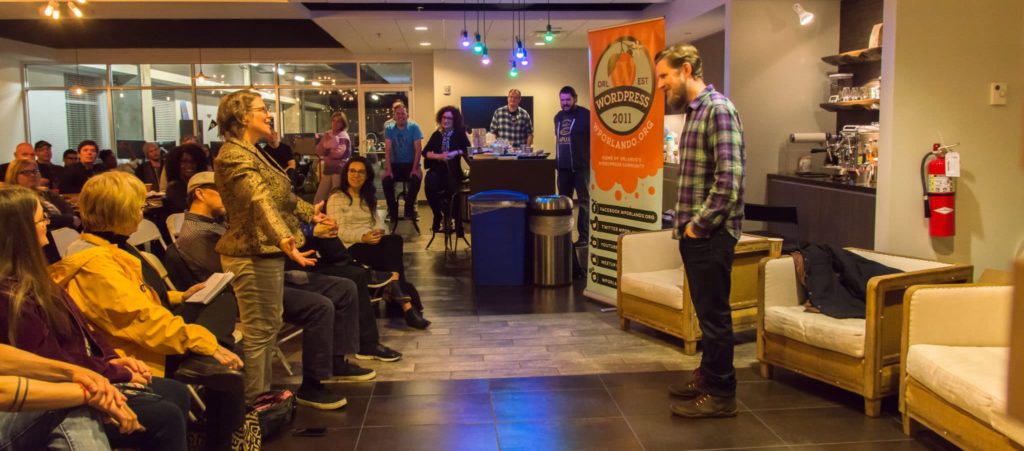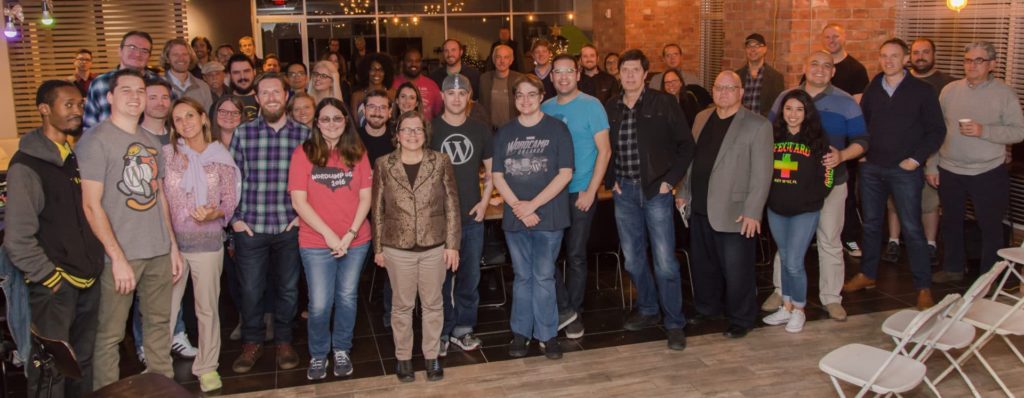This evening Matt Mullenweg, Founder, and CEO of Automattic, Inc, attended the Orlando WordPress Meetup this evening to do an open floor Q&A much like a TownHall meeting. There was a lot of discussion about various topics, however, the center of it very much revolved around the new Gutenberg WordPress 5.0 Release. The audience engaging in questions consisted of users, developers, agency owners, and the like so the questions were from various angles. The following is a general recap of the questions that were asked throughout the meeting.
Gutenberg & WordPress 5.0
How should Agency Owners prepare for the Future Update?
There are a lot of agencies worried about what will happen to their client’s sites with this next major update rolling out. It was nice to hear from Matt that they have created a Classic Editor Plugin that will allow you to temporarily “Opt-Out” of the new Gutenberg interface. The Classic Editor plugin will allow all non-Gutenberg updates to remain in place after the update to 5.0 but will turn off solely the Gutenberg functionality. This will allow for the time to properly test plugin compatibility, complete the learning curve and review help docs to ensure a smoother transition. The WordPress Plugins team is reviewing and testing major plugin compatibility with the new Gutenberg functionality to help eliminate bugs before the launch, although, it is still recommended to update everything inside a staging environment first. Matt did mention that for some there will be a “transitioning cost”, but that it will be #WorthIt.
What is the Timeframe that the Classic Editor will Work?
 This was brought up at WordCamp US by someone as well in the Q&A there. It is important to understand the reason behind why the clock on switching over will be ticking after the launch of the new 5.0. The reality is that currently Plugin Developers are developing, maintaining, updating and planning on supporting 2 versions of their plugins for the time being. One side of the plugin will work inside the Classic Editor or Classic Editor Plugin (depending on if the site is upgraded to 5.0 or not) and the other completely separate setup will be for the Gutenberg Editor. This will be costly long-term for plugin shops to maintain. While Matt did not say if there was an exact time frame, he did suggest having everything completed by the close of the 2018 year. While it doesn’t seem that there are any time frames yet on removing the Classic Editor plugin, it will be best to make the switch as soon as possible, even if there is a cost involved.
This was brought up at WordCamp US by someone as well in the Q&A there. It is important to understand the reason behind why the clock on switching over will be ticking after the launch of the new 5.0. The reality is that currently Plugin Developers are developing, maintaining, updating and planning on supporting 2 versions of their plugins for the time being. One side of the plugin will work inside the Classic Editor or Classic Editor Plugin (depending on if the site is upgraded to 5.0 or not) and the other completely separate setup will be for the Gutenberg Editor. This will be costly long-term for plugin shops to maintain. While Matt did not say if there was an exact time frame, he did suggest having everything completed by the close of the 2018 year. While it doesn’t seem that there are any time frames yet on removing the Classic Editor plugin, it will be best to make the switch as soon as possible, even if there is a cost involved.
How will Backwards Compatibility Work in 5.0?
Matt mentioned that the last thing he wants is a bad user experience and he certainly doesn’t want to break any sites in a way a user can’t figure out how to fix it. That being said he also mentioned the Classic Editor plugin for the third time. It seems that the important thing to take away from this is that it will be a MAJOR release.
When will Accessibility Features be Added to 5.0?
Gutenberg will incorporate a plethora of accessibility features at launch. Matt reminded us all that a lot of code gets scrapped when prototyping a new concept and that it takes a lot of work to fine tune accessibility features. Matt also explained the development process a bit in that from ideation to launch includes several iterations. The accessibility features get added into WordPress core during the last half of those iterations to avoid throwing away code that is so very time-consuming.
What are Your Thoughts on “Block Bloat”?
First of all, with this new system, everything is built on blocks. The idea of Block Bloat would be the existence of too many blocks that it would be hard to find the blocks you need in order to complete your needed functions on the website. Matt addresses this by talking about how part of the greatness of Gutenberg is it is built to be simple and intuitive. There are not going to be constraints on how many blocks can be made or installed so that maximum functionality of the system can be utilized. Matt mentioned that the blocks will be searchable via a shortcut code or a plus symbol and that your most frequent blocks will be viewed first. This will allow you to have the most flexibility with the least amount of Block Bloat.
How do we Bridge the Gutenberg Gap?
First of all, Matt reminded us that the Gutenberg plugin is in the WordPress repo ready to be downloaded today! This is a great way to test it out on your site on staging or local environment to see how it all will work. We do not recommend to try this on your live site as there are no guarantees how the site will respond since there are so many variables. Next, he reminded everyone that the Classic Editor Plugin does exist, and is also in the plugin repository for download. If something does go awry when adding the Gutenberg plugin then you can deactivate it, remove it and add the Classic Editor Plugin until you are ready to dive into why the issue exists. There will be a learning curve, but because the Gutenberg plugin is out now and the Classic Editor plugin will stay in existence for a while you have time to master the learning curve.

WordPress & The Future
How far out do you think about the web?
Matt mentioned in his response to this question that he likes to think out as far as possible. However, he also reminded us that 13 years ago was when the last major WordPress editor change was made. At the time there was no iPhone, no mobile internet other than that on a Blackberry and so those kinds of concerns weren’t very relevant at the time. Now WordPress JetPack includes AMP pages, responsive forms, and so much more. The one thing that has stayed the same over the years is that the web remains central to our lives. WordPress has made it possible to publish content consistently and continually and that is what Matt said he always thinks about when strategizing what comes next.
When you started WordPress what goals did you set as a measure of success and have you reached it?
Matt said jokingly he was 29% of the way there. WordPress makes up 29% of the internet at the moment, but it is also good to know that the man overseeing the growth of such a huge Open Source platform isn’t satisfied with the level of innovation. Innovation only stops when satisfaction is reached. Matt elaborated though that if everyone utilizing the WordPress platform gave back to the WordPress community even 5% of their time, talents, or dollars on sponsorship of events we could significantly grow the community we have all come to know and love.
What is the most effective way to incorporate design into the future of the web?
The answer Matt gave was absolutely amazing. He said that designers have to have an equal seat at the table. When you are building a product, a site, a software system design and User Experience is just as important as the code that is written to power the design. The last few sets of WordPress Core releases have had a Design and Developer team lead. This ensures that design is not an afterthought and that development is not an afterthought. Rather this setup allows Development and Design to walk hand in hand.
Why is there not a harder push to get hosting companies to switch to PHP 7.0?
Currently, a lot of host providers are still using PHP 5.4 even though 7.1 is released and 5.4 is no longer supported. The fact of the matter is that a lot of web hosts have very thin margins. This means that they are forced to either patch the issues in 5.4 and not upgrade or that the upgrade is rolled out over a large block of time. What Matt said WordPress has done to help users push their hosts to migrate is they have listed in the best practices documentation that 7.0 is best practice. Also, there is a notification inside the WPAdmin that the site is not on PHP 7.0 and to ask their host to update. Also, WordPress has a letter you can copy and paste and send to your hosting provider to request an upgrade on the WordPress about page. All of these are done to help push hosts to make the upgrade, but sometimes it comes down to consumers pushing the host directly.
WordPress recommends several hosting companies, what are the criteria for being recommended?
Matt said that there is a huge list of criteria and that once a year the hosting companies have to apply to be considered. He also mentioned that there was a host that was both added and removed last year, but he wasn’t going to mention any names. The fact is, WordPress does a good bit of homework before the names go on the list and there are many good and even amazing hosts that are not on the list. Here are a few of the things that are considered: benchmark testing including uptime monitoring, how many sites they host, level of support provided, how fast updates are rolled out automatically, how long have they been around and so much more. Matt said that it is an art as much as a science in who they recommend and that it is balanced out in that consumers can post complaints directly to the host from the recommendations page that are monitored for a better response time. Matt said that he wants WordPressers to have the best experience possible from the hosts.

Other Great Questions
What ammo would you use as an agency owner when selling against Drupal or Shopify?
Matt jokingly mentioned that whitehouse.gov just made the switch from Drupal this year. He also mentioned that the long-term viability of WordPress and the long-term maintenance costs were significantly less expensive. Anytime a major update comes out on other platforms it requires a lot of hours to complete the move with WordPress you don’t have that issue.
On the other side, What ammo would you use to fight against Wix and Squarespace with small businesses?
The benefit to WordPress over the other DIY options is that eventually there is a ceiling that his hit on the Wix sites that inhibit continued growth. WordPress is scaleable. It provides a long-term viability than other options on the market just do not offer. The WordPress community itself offers a level of support unlike any other. There are meetups, WordCamps, and user groups worldwide that offer assistance, support and general knowledge to help businesses grow. There is freedom and flexibility with WordPress with no limit to how big your business can get as it is the small business and enterprise option.
Automatic is a remote team with hundreds of employees, What advice can you offer for making remote work, work?
While everyone may not be equals on the organization chart itself, Matt made it clear that everyone needs to feel as if they are on an equal footing. He mentioned that we should all remember that amazing ideas come from every level of the company and that people should feel free to express those ideas. He also talked about having a team outing a few times a year and how one of this years team outings will be here in Orlando. This allows people to see each other face to face and learn things about each other like the tone of voice, sense of humor and all the nuances that are not seen hidden in the text.
Do Collaboration Tools help block out the noise and create the culture for a distributed team?
Yes and No. Matt explained that the team is created as a communal effort and that tools and systems that work for one team won’t always work for all teams. However, it is important to test new tactics and techniques for communication as every team is different. The other key takeaway was that every year or quarter depending on the team you should take a step back and evaluate the processes being used to be sure they still make the most sense. As the team evolves so will communication practices, processes, and discussions.
What was the coolest trip or experience from last year?
This was by far one of my favorite questions/answers from the whole night. Matt travels a lot. It is part of the fiber of his job running Automattic. What was most interesting was that in all the busyness he took the time to extend his trip to WordCamp Europe (work trip) to include 7 weeks to see Europe and to take a writing class. He didn’t take time off of work to do this class but rather worked 20 hour days to ensure that everything got handled. He explained how the class had 4 different professors that are professional writers each in a different genre. He initially thought he would choose a genre, but he later found out the class would stretch his comfort zone as he had to work on all 4 genres including reading a poem he wrote at a cafe. The most important takeaway for me personally was that he got the joy out of learning. He told us all to “take time to learn for learning’s sake.”
Isn’t that what the WordPress community is all about? We are learning, pushing forward our industry, building others businesses, forging a way to be our best self all because it is what we are passionate about. Take time to learn something new today.
Photography contribution by Jean Perpillant of Design Theory

Thanks for great update, Sandy! I think the WordPress community’s still nervous of the major release this year – it’s a make or break for some development business. It greatly depends on how fast and accurate plugin/theme authors can re-write their codes for it to be compatible with Gutenberg.
There are already quite a number of Gutenberg addons available in WordPress repository. Maybe this is an alternative way to address the transition gap. Here’s our recently released Guttenberg addon — Stackable: Ultimate Gutenberg Blocks. In a single install, it already provides an additional 23 Gutenberg blocks (separators, icons, bars to name a few). It’s already available in the WordPress repository (https://wordpress.org/plugins/stackable-ultimate-gutenberg-blocks/).
Would love to know what you think of it!